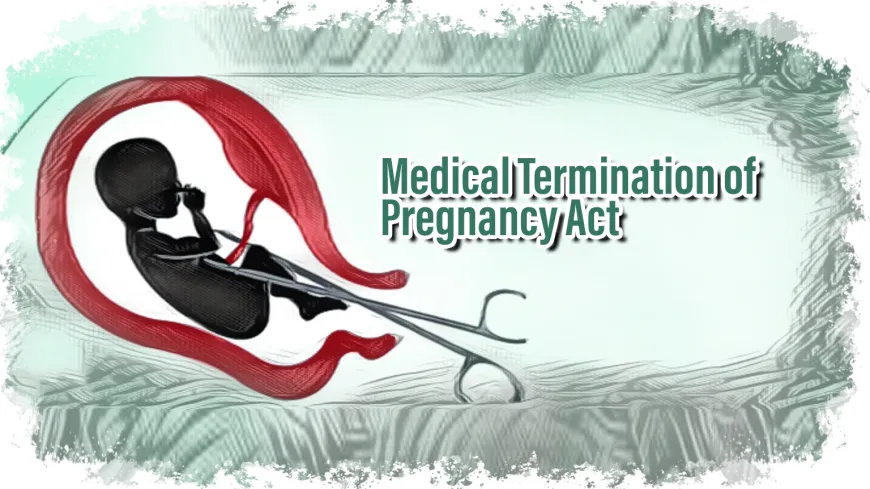Syllabus:
GS2: Issues Relating to the Development and Management of Social Sector/Services relating to Health, Education and Human Resources.
Context:
The Delhi High Court recently issued guidelines to streamline Medical Termination of Pregnancy procedures for sexual assault survivors after a minor rape victim was denied timely care due to miscommunication and administrative lapses.
More on the News
- The court directed Delhi Police to ensure that officers handling POCSO and sexual assault cases undergo biannual training on MTP procedures and coordination with authorities.
- Officers must also promptly present survivors to medical boards with all necessary documents and training certificates should be recorded in their service files.
- The court mandated quarterly training sessions for doctors and medical staff, to be conducted in coordination with legal aid bodies like the Delhi State Legal Services Authority and the Delhi High Court Legal Services Committee (DHCLSC).
- Each government hospital was directed to appoint a nodal officer for MTP cases to coordinate with the CWC, police, and courts.
- Additionally, consent for MTP procedures was to be obtained from the survivor or her guardian, in a language they fully comprehend, such as Hindi or English.
What is abortion
- Abortion means ending a pregnancy on purpose, usually within the first 28 weeks. It can be done using medicines or medical procedures, depending on how far along the pregnancy is and what the person prefers.
- Abortion is a sensitive and often debated issue. People have different opinions about it based on their values, beliefs, religion and the law.
Legal Provisions for abortion in India
- Until the 1960s, abortion was illegal in India. Anyone who broke this law could be jailed or fined under Section 312 of the Indian Penal Code.
- In the mid-1960s, the government formed the Shantilal Shah Committee to study whether abortion laws were needed.
- Based on the committee’s report, the Medical Termination of Pregnancy (MTP) Act was passed in 1971. This law allowed safe and legal abortions to protect women’s health and reduce deaths during pregnancy.
- In a progressive decision, the Supreme Court also allowed abortion in cases of marital rape, even though marital rape is not yet a crime under Indian law.
- The Constitution of India guarantees the right to life and personal liberty under Article 21. The Supreme Court has interpreted this to also include a woman’s right to make reproductive choices and have control over her own body.
- In Justice K.S. Puttaswamy (Retd.) vs. the Union Of India Case, 2017, the Supreme court recognized the constitutional right of women to make reproductive choices, as a part of personal liberty under Article 21 of the Indian Constitution.
Medical Termination of Pregnancy Act (MTP) Act 1971
- As per section 3 of the MTP Act, the termination of pregnancy up to 20 weeks of conception can be undertaken on the advice of one registered medical practitioner.
- In the case of pregnancy between 20 and 24 weeks, abortion is permitted only after two registered medical practitioners opine for it.
- Rule 3B of the MTP Rules of 2003, formed under the MTP Act, permits abortion between 20 to 24 weeks of pregnancy for some categories including victims of sexual assault or rape, minors, change in the marital status of a woman during pregnancy, women with physical disabilities or mental illness.
- After 24 weeks, the MTP Act requires medical boards of expert doctors to be set up by the state government in each district, which opine on whether to allow termination of pregnancy in case of substantial foetal abnormality.
Abortion at Private Hospital
- Section 4 of the MTP Act says a pregnancy can be terminated at a hospital established or maintained by the government, or a place for the time being approved under the MTP Act by a Government or District Level Committee headed by a Chief Medical Officer or District Health Officer.
- Under Rule 5(6) of the MTP Rules, the committee can approve abortion requests from private hospitals upon submission of ‘Form A’, covering pregnancies up to 12 weeks and up to 24 weeks.
MTP Amendment Act, 2021
- Gestation Limit: Extended to 24 weeks for special categories (rape survivors, minors, etc.).
- Medical Opinion: Abortions up to 20 weeks require one doctor, 20–24 weeks need two.
- Unmarried Women: Allowed abortion if contraceptive fails
- Medical Boards: Review cases beyond 24 weeks for fetal abnormalities.
- Confidentiality: Patient identity must be protected.
Mains Practise Question The Medical Termination of Pregnancy (Amendment) Act 2021 has been hailed as a progressive reform in reproductive rights of women. Critically analyze its impact on healthcare accessibility and state regulatory mechanisms. Also, discuss the possible legal challenges and implementation issues.

